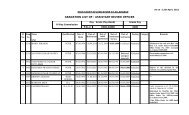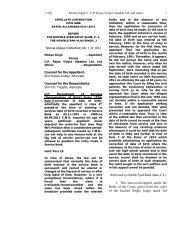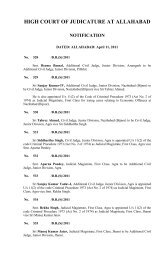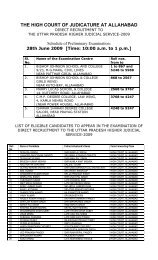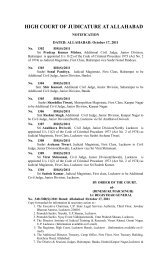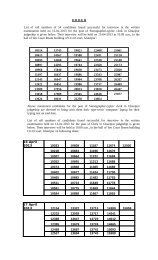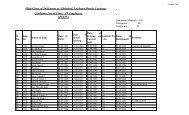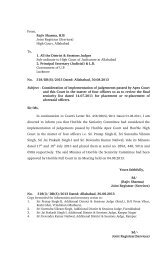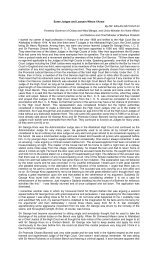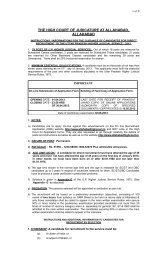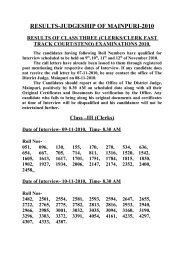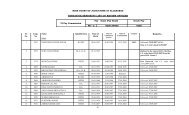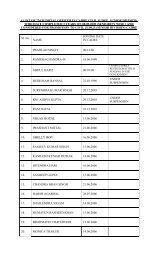Nov - High Court of Judicature at Allahabad
Nov - High Court of Judicature at Allahabad
Nov - High Court of Judicature at Allahabad
You also want an ePaper? Increase the reach of your titles
YUMPU automatically turns print PDFs into web optimized ePapers that Google loves.
3 All] Rishikesh Lal Srivastava V.St<strong>at</strong>e <strong>of</strong> U.P. and others 1069<br />
sanction. We agree with the submission <strong>of</strong><br />
Sri Ojha th<strong>at</strong> a combined reading <strong>of</strong><br />
Regul<strong>at</strong>ions 31 and 37 makes it amply<br />
clear th<strong>at</strong> the District Inspector <strong>of</strong> Schools<br />
is not required to undertake any such<br />
exercise, which is to be done only by the<br />
Head <strong>of</strong> the Institution in the case <strong>of</strong> Class<br />
- IV employees. The submission is,<br />
therefore, devoid <strong>of</strong> substance and has<br />
been noted only to be rejected.<br />
64. We have also perused the notes<br />
submitted by Sri R.C. Singh annexing<br />
therewith the General Principles <strong>of</strong><br />
Interpret<strong>at</strong>ion as contained in Chapter II<br />
<strong>of</strong> the St<strong>at</strong>utory Rules <strong>of</strong> Interpret<strong>at</strong>ion,<br />
by Justice G.P. Singh. Having given our<br />
anxious consider<strong>at</strong>ion to the said Rules, as<br />
contained therein and as pointed out by<br />
Sri R.C. Singh, we find th<strong>at</strong> said Rules on<br />
the contrary milit<strong>at</strong>e against the<br />
submissions as advanced on behalf <strong>of</strong> the<br />
employees pointed out hereinabove. The<br />
aforesaid principles have been considered<br />
in a large number <strong>of</strong> authorities and the<br />
conclusion drawn is th<strong>at</strong> the intent and<br />
purpose <strong>of</strong> the provisions in the light <strong>of</strong><br />
the enactment made, has to be considered<br />
in order to avoid any absurdity. We have<br />
already pointed out th<strong>at</strong> by a reading <strong>of</strong><br />
the Regul<strong>at</strong>ions, it is more than clear th<strong>at</strong><br />
the Rule making authority clearly<br />
intended to exclude the applicability <strong>of</strong><br />
prior sanction as contained in Regul<strong>at</strong>ion<br />
31 in respect <strong>of</strong> Class-IV employees. To<br />
add further, would be repe<strong>at</strong>ing wh<strong>at</strong> has<br />
already been observed hereinabove.<br />
65. Another aspect <strong>of</strong> the m<strong>at</strong>ter,<br />
which clarifies the intention <strong>of</strong> the Rule<br />
making authority as pointed out by Sri<br />
R.K. Ojha is th<strong>at</strong> in respect <strong>of</strong> Class-III<br />
employees, Regul<strong>at</strong>ions 44 and 44-A were<br />
expressly included under Chapter III,<br />
which envisage a separ<strong>at</strong>e procedure in<br />
respect <strong>of</strong> disciplinary action for the<br />
clerical cadre <strong>of</strong> employees. This<br />
however, illustr<strong>at</strong>es th<strong>at</strong> the Rule making<br />
authority did not apply any other<br />
provision to Class-IV employees and<br />
specifically empowered the Head <strong>of</strong> the<br />
Institution, namely the Principal or the<br />
Headmaster to take action <strong>at</strong> his end in<br />
respect <strong>of</strong> a disciplinary proceeding<br />
against a Class-IV employee. The<br />
aforesaid illustr<strong>at</strong>ion further removes the<br />
cloud and expresses clarity on a<br />
comparison <strong>of</strong> the provisions th<strong>at</strong> had<br />
been referred to hereinabove.<br />
66. Responding to the submissions<br />
th<strong>at</strong> were raised, Sri M.C. Ch<strong>at</strong>urvedi,<br />
learned Chief Standing Counsel appears<br />
to be right in his submissions th<strong>at</strong> the<br />
Rule making authority clearly intended to<br />
restrict the meaning <strong>of</strong> the word<br />
'employees' occurring in Regul<strong>at</strong>ion 31 in<br />
accordance with Regul<strong>at</strong>ion 100 to mean<br />
th<strong>at</strong> a prior sanction would not be<br />
required in the case <strong>of</strong> a Class-IV<br />
employee. We accept his submission th<strong>at</strong><br />
the wisdom <strong>of</strong> the legisl<strong>at</strong>ure should not<br />
be doubted and the Rule making authority<br />
will be presumed to be conscious <strong>of</strong> the<br />
departure th<strong>at</strong> was deliber<strong>at</strong>ely made for<br />
the procedure to be adopted in the case <strong>of</strong><br />
Class-IV employees.<br />
67. Having laid threadbare the first<br />
principles on which we have interpreted<br />
the provisions, we have no hesit<strong>at</strong>ion in<br />
coming to the conclusion th<strong>at</strong> there is no<br />
requirement under the Regul<strong>at</strong>ions for a<br />
prior sanction or approval <strong>of</strong> the Inspector<br />
<strong>of</strong> Schools in respect <strong>of</strong> order <strong>of</strong><br />
termin<strong>at</strong>ion <strong>of</strong> Class-IV employees.<br />
68. Coming to the decisions th<strong>at</strong><br />
have been cited <strong>at</strong> the Bar, we may point<br />
out th<strong>at</strong> in the case <strong>of</strong> Shankar Saran Vs.



